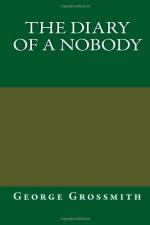Lupin said: “Oh! there’s nothing much about it, except I have not once seen him since his marriage, and he said he was very pleased to see me, and hoped we should be friends. I stood a drink to cement the friendship, and he stood me a new hat—one of his own.”
I said rather wearily: “But you have not told me your old friend’s name?”
Lupin said, with affected carelessness: “Oh didn’t I? Well, I will. It was Murray posh.”
May 14.—Lupin came down late, and seeing me at home all the morning, asked the reason of it. Carrie and I both agreed it was better to say nothing to him about the letter I was writing, so I evaded the question.
Lupin went out, saying he was going to lunch with Murray Posh in the City. I said I hoped Mr. Posh would provide him with a berth. Lupin went out laughing, saying: “I don’t mind wearing Posh’s one-priced hats, but I am not going to Sell them.” Poor boy, I fear he is perfectly hopeless.
It took me nearly the whole day to write to Mr. Crowbillon. Once or twice I asked Carrie for suggestions; and although it seems ungrateful, her suggestions were none of them to the point, while one or two were absolutely idiotic. Of course I did not tell her so. I got the letter off, and took it down to the office for Mr. Perkupp to see, but he again repeated that he could trust me.
Gowing called in the evening, and I was obliged to tell him about Lupin and Mr. Perkupp; and, to my surprise, he was quite inclined to side with Lupin. Carrie joined in, and said she thought I was taking much too melancholy a view of it. Gowing produced a pint sample-bottle of Madeira, which had been given him, which he said would get rid of the blues. I dare say it would have done so if there had been more of it; but as Gowing helped himself to three glasses, it did not leave much for Carrie and me to get rid of the blues with.
May 15.—A day of great anxiety, for I expected every moment a letter from Mr. Crowbillon. Two letters came in the evening—one for me, with “Crowbillon Hall” printed in large gold-and-red letters on the back of the envelope; the other for Lupin, which I felt inclined to open and read, as it had “Gylterson, Sons, and Co. Limited,” which was the recommended firm. I trembled as I opened Mr. Crowbillon’s letter. I wrote him sixteen pages, closely written; he wrote me less than sixteen lines.
His letter was: “Sir,—I totally disagree with you. Your son, in the course of five minutes’ conversation, displayed more intelligence than your firm has done during the last five years.— Yours faithfully, Gilbert E. Gillam O. Crowbillon.”
What am I to do? Here is a letter that I dare not show to Mr. Perkupp, and would not show to Lupin for anything. The crisis had yet to come; for Lupin arrived, and, opening his letter, showed a cheque for 25 pounds as a commission for the recommendation of Mr. Crowbillon, whose custom to Mr. Perkupp is evidently lost for ever. Cummings and Gowing both called, and both took Lupin’s part. Cummings went so far as to say that Lupin would make a name yet. I suppose I was melancholy, for I could only ask: “Yes, but what sort of a name?”




